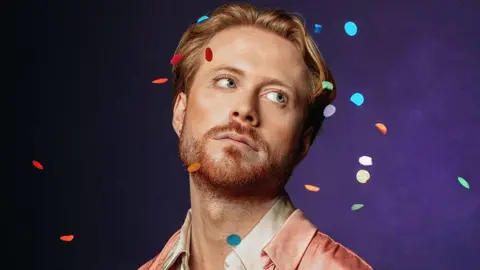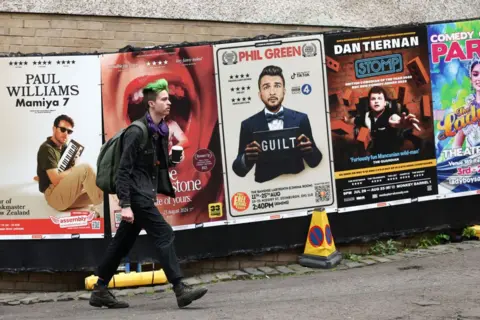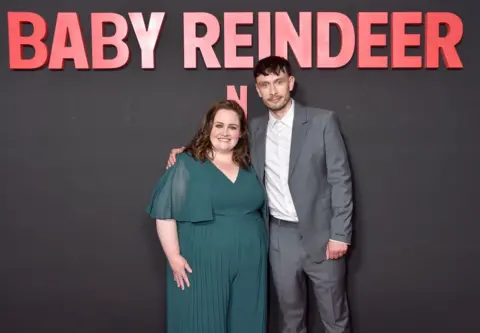I caught malaria in a medical trial to fund my Edinburgh Fringe show
 Rebecca Need-Menear
Rebecca Need-MenearWhen comedian John Tothill set his sights on performing at the Edinburgh Festival Fringe, he knew he would have to take radical action to afford the eye-watering upfront costs.
Lured by the prospect of boosting his savings, he signed up for a medical trial that would see him infected with malaria - a deadly disease that causes about 600,000 deaths annually around the world.
It led to a few days of fever, painful joints and hallucinations - which he was lucky enough to have cured in a controlled environment with medication.
The whole process helped fund his festival debut as a stand-up.
"I got paid about £2,500 all in and if I'm honest with you, I would have done it for less," he told BBC Scotland News.
 Rebecca Need-Menear
Rebecca Need-MenearThe malaria medical trial gave him the cash to set up his solo show at Edinburgh in 2023.
And he has returned to his experience of contracting the disease to provide the material for his 2024 run.
He "really, really" loves Edinburgh in August and is still prepared to make huge sacrifices to indulge his love of performing to festival crowds.
"What's so bad is if it was even more expensive, I'd still come and do it and I would just go on another malaria trial," the 27-year-old said.
"I probably shouldn't have had to have got a [life-threatening] disease in order to come and do this, but I don't regret it, you know."
John saved money for his first solo Edinburgh show from a series of jobs, including as a teaching assistant and a bag packer in a coffee factory.
But he knew he still needed a big injection of cash and signed up for the malaria trial investigating how the body reacts in the early stage of infection.
"They said to me that the reason the trial is well paid isn't really because it's that risky, it's because it sounds frightening," he said.
"It's a disease that everyone's heard of, and obviously it's still one of the biggest killers in the world."
Malaria is spread by mosquitoes and is mostly found in tropical countries. It is preventable and curable but it caused an estimated 608,000 deaths in 2022, according to the World Health Organisation.
Medics told him they would infect him with a tiny amount of the disease, and once he developed symptoms they would treat him with effective medication.
Two weeks later he began feeling very sick over the course of about an hour.
"It was definitely the sickest I'd ever felt," he said.
He was kept under close observation in a medical facility while he experienced a fever, difficulty in sleeping and concentrating, and a "panging pain" in his fingers and joints.
"And then when my temperature got a bit higher, I had these nightmares which turned into waking hallucinations," said John, who lives in London.
"At one point I thought that there was a devil in my room that was dragging me into hell or something, which wasn't ideal at all."
After four days, the medication kicked in and he quickly started to feel better.
"The really, really, really strange thing about it was how much the physical pain of the malaria was actually very offset by the certainty of knowing exactly what was wrong with me, knowing exactly what the timetable was, and the doctors knew exactly what was wrong with me," he said.
 Getty Images
Getty ImagesHis fee covered the upfront costs of his 2023 Edinburgh show, which cost about £9,000 in total.
That paid for accommodation, venue hire, marketing materials and PR, and fees for the producer and director.
He managed to break even, meaning he had the funds to return this year with Thank God This Lasts Forever at the Pleasance Courtyard Beside.
"It's about my malaria trial and what I feel it taught me and most of all, I think it's about the prioritising your pleasure in life over anything like a career or any kind of precious notion of time-keeping or that sort of thing.
"It was a huge privilege to be in a situation where I was never made to feel afraid of what might happen because I knew exactly what was wrong with me, and I think that affected the way I view time, which sounds quite lofty but is explained across the course of an hour-long show."
 Getty Images
Getty ImagesAs an up-and-coming stand-up, he knows it's important to appear in Edinburgh to have any hope of making comedy a full time career.
The success of Netflix hit Baby Reindeer - a series based on Richard Gadd's 2019 Edinburgh show - proves the investment can be worth it.
"It's the one place you know you stand a chance of being seen [by TV producers and commissioners].
"It's also the place where more public will see you than in London, because the infrastructure is there of tourists coming to see comedy.
"But the spiralling costs of the Fringe are pricing some performers - like Richard Herring and Gail Porter - out of the market. Jason Manford has said he will make a financial loss this year.
John points out that going to the Edinburgh Fringe "isn't a human right" but it's up to local government policy makers to make accommodation more affordable.
"I'm sure that's doable and what I would say is if this was a sport event, it would be doable."
